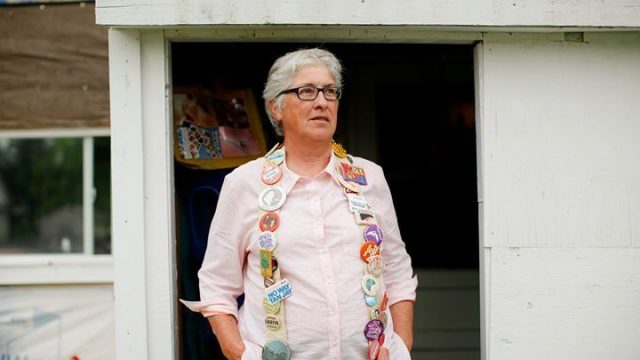Not all LGBT Native Americans embrace the term “two-spirits.” There are many reasons for this; I think possibly the best is that the idea that “Native American” is a single culture is wrong. It’s hundreds of cultures spread across two continents. Even if each culture’s pre-colonial traditions had been meticulously documented and preserved, and goodness knows they were not, the idea that every single one of those cultures had a specific place in their culture for people who did not fit designated roles of gender and sexuality, and that it was the same place across all those cultures, is faulty. Still, since the previous anthropological term can roughly be translated to “boy prostitute,” it’s a definite improvement?
One of the people strongly behind the new term is Marjorie Beaucage. Her IMDb page is woefully incomplete, but it’s also clear that she has not been able to get the funding to really do the work she wants to. She not only self-identifies as two-spirit, she has made a film detailing stories of people in Saskatchewan dealing with their issue of being under that particular umbrella. From what I can tell, she uses the term to embrace all LGBT identities.
She’s got an interesting process.She does collaborative documentary filmmaking, which I’m not sure I’ve ever heard of before. It seems to be based on the storytelling practices of her heritage. She rejects the hierarchical nature of a lot of traditional filmmaking, which may be part of why her IMDb page is incomplete—if she’s not directing in the Hollywood sense, she doesn’t necessarily fit into the structure of IMDb. And as I’ve mentioned before, once you get into the lower categories, IMDb doesn’t know what to do with itself.
Of course, her work isn’t the easiest to find regardless. One of the only YouTube results I got for her was a Zoom service from a Unitarian church in Saskatoon where she gave a sermon during lockdown. (And that’s a sentence I’m sure none of us ever expected to make sense.) Apparently more of it is on Vimeo, but the fact is, it’s certainly not on any of the major services. Which is a shame, because it sounds fascinating.
In addition to counting herself as two-spirit, she also calls herself Métis, which means she is a descendant of both the First Nations people of Canada and the European conquerors. Even if her films are difficult to access, at least she is using them to record the feelings, history, and experiences of people not documented by the establishment. That, at least, is more than her ancestors had.
She allegedly financed one of her films using “a potluck and a chain letter”; at least I have my Patreon and Ko-fi!

